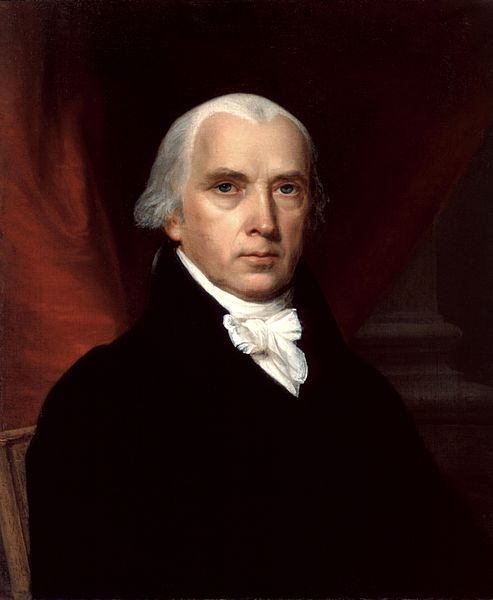The First Ten Amendments or
The Bill of Rights
The First Ten Amendments to the US Constitution are also known as the Bill of Rights. It is a list of rights guaranteed to the American people that the government is not allowed to infringe upon. The First Ten Amendments were added to the Constitution at the direction of the very first Congress in 1789, though they were not official law until 1791. They were added because many people believed the Constitution did not adequately protect them from the government's power.
James Madison led the fight to add the amendments in order to gain much wider support for the Constitution itself. Congress actually voted to have twelve amendments, but only ten were passed by the states. The Constitution requires that 3/4 of the state legislatures must accept an amendment for any change to be made to the Constitution.
What do the First Ten Amendments actually say? What rights are protected by them?
The following section gives you a brief overview of what is in each amendment with a link you can click on for more in depth information.
The First Amendment
The First Amendment is without a doubt the most well known to Americans of the First Ten Amendments. Its familiar prohibitions against Congress making any laws regarding freedom of religion, freedom of speech and freedom of the press are some of the most commonly repeated thoughts in the discussion of politics in America.
The First Amendment consists of seven parts:
- The Opening Clause - states that Congress can not make laws about the forthcoming topics;
- The Establishment Clause - prohibits the government from establishing a state sanctioned church or religion and from favoring one religious group over another;
- The Free Exercise Clause - says Congress cannot interfere with people's religious expression;
- The Freedom of Speech Clause - this guarantees freedom of speech to all Americans without fear of being punished by the government for saying something the government doesn't agree with;
- The Freedom of the Press Clause - guarantees freedom of the press to print or advocate any message they want without fear of being punished by the government;
- The Freedom of Assembly Clause - guarantees that you can assemble with anyone you want to whenever you want;
- The Freedom of Petition Clause - guarantees that you can petition government officials to correct things that you think the government may be doing wrongly.
You can read more in depth about the meaning of each part of the First Amendment by clicking here.
Second Amendment
One of the First Ten Amendments that receives a lot of discussion these days is the Second Amendment because of gun violence, especially after disasters such as the Aurora, Colorado movie theater shooting. The 2nd Amendment consists of two clauses:
- The Well Regulated Militia Clause - which says each state can have its own local militia;
- The Right to Bear Arms Clause - which says that individuals have the right to keep and bear arms.
- The Well Regulated Militia Clause - which says each state can have its own local militia;
- The Right to Bear Arms Clause - which says that individuals have the right to keep and bear arms.
The controversy lies in the interpretation of this amendment. Does it mean only that States can have a militia, or does it also mean that individuals can also have arms for self defense, rather than for national defense?
Read more about the interpretations and meaning of the Second Amendment here.
Third Amendment
The Third Amendment is not as well known to most Americans as some of the other First Ten Amendments because it addresses a topic that hasn't much affected modern life, war on American soil. The 3rd Amendment has only one clause:
- The No Quartering of Troops Clause - This means that the government is not allowed to house troops in people's homes or on their property during peace time without their consent, or during war time except as prescribed by law.
Read more about the history and meaning of the Third Amendment here.
Fourth Amendment
The Fourth Amendment protects your stuff from unreasonable searches and seizures of property by the government. The Founding Fathers considered the right to personal property as one of the foundations of freedom and liberty. The 4th Amendment consists of two main parts:


- The Unreasonable Searches and Seizures Clause - this means that government officials must have a very good reason, such as evidence that points to a crime, in order to search someone's personal property;
- The Warrants Clause - This clause states that the government must have a properly executed warrant, meaning that a judge has looked at the evidence and has issued a formal order, in order to search or confiscate someone's personal property. In other words, they cannot search your property just because they want to.
- The Unreasonable Searches and Seizures Clause - this means that government officials must have a very good reason, such as evidence that points to a crime, in order to search someone's personal property;
- The Warrants Clause - This clause states that the government must have a properly executed warrant, meaning that a judge has looked at the evidence and has issued a formal order, in order to search or confiscate someone's personal property. In other words, they cannot search your property just because they want to.
You can read more about the meaning of the Fourth Amendment here.
Fifth Amendment
The Fifth Amendment is better known to Americans than some of the other of the First Ten Amendments, mostly due to the familiar plea of criminal defendants, "I plead the Fifth." The Fifth Amendment deals mostly with the rights of the accused in a criminal trial. The Fifth Amendment consists of six clauses, which are:
- The Grand Jury Clause - Gives defendants the right to have very serious charges screened and approved by a Grand Jury of their fellow citizens;
- The Military Cases Clause or Grand Jury Exception Clause - This clause excepts people in the armed services in actual service from the Grand Jury right in the previous clause;
- The Double Jeopardy Clause - This means that a person cannot be tried or punished for the same crime more than once;
- The Self-Incrimination Clause - People cannot be forced to testify against themselves in court. This is popularly called "pleading the Fifth" or "taking the Fifth;"
- The Due Process Clause - This states that the government cannot punish someone unless there has been a thorough process followed that protects the rights of the accused during a trial or investigation;
- The Eminent Domain Clause, also known as the Just Compensation Clause - This clause states that the government must pay a fair amount for any lands it takes through the process of eminent domain.
You can read more about the Fifth Amendment here.
Sixth Amendment
The Sixth Amendment contains even more rights of those accused by the state of criminal wrongdoing, showing how important it was to the Founders to protect the common person from the power of the state. The state has a lot of power when it is trying to convict someone and this Amendment tries to empower the accused to defend himself. The 6th Amendment consists of seven parts:


- The Speedy Trial Clause - This clause states that people have a right to have their case tried quickly and not drag on forever and ever;
- The Public Trial Clause - This guarantees a public trial. In other words, the government cannot try someone in secret;
- The Right to Trial by Jury Clause - This means that criminal defendants have the right to be judged by a jury of their neighbors;
- The Arraignment Clause - This states that people have a right to be notified of the nature and circumstances of the crime they are being charged with;
- The Confrontation Clause - This states that a defendant has the right to be confronted by the witnesses who are testifying against him;
- The Compulsory Process Clause - This states that the defendant must be allowed to procure witnesses in his favor;
- The Right to Counsel or Assistance of Counsel Clause - this states that a defendant has the right to have a lawyer for his defense.
You can read more about the Sixth Amendment here.
Seventh Amendment


The Seventh Amendment contains the third guarantee in the First Ten Amendments of the right to trial by jury. You can see that it was a very important right to the Founding Fathers to be addressed so many times. By allowing a group of local citizens to judge whether or not a person is guilty, the Founders were protecting the accused from unfair or malicious government judges and prosecutors. The Seventh Amendment has two main parts:
- The Trial by Jury in Common Law Clause - This clause is the third mention in the First Ten Amendments of the right to trial by jury;
- The Reexamination Clause - This clause forbids any court from reexamining or overturning any decision made by a jury.
You can read more about the Seventh Amendment here.
Eighth Amendment
The Eighth Amendment deals with punishments that courts may impose on convicted people. It has two main clauses:


- The No Excessive Fines Clause - This clause says that courts may not impose excessive bail or fines upon defendants. What exactly an excessive fine is is up to interpretation;
- The Cruel and Unusual Punishments Clause - This clause forbids courts from imposing cruel or unusual punishments upon people. Usually the definition of a cruel or unusual punishment changes with each successive generation.
- The No Excessive Fines Clause - This clause says that courts may not impose excessive bail or fines upon defendants. What exactly an excessive fine is is up to interpretation;
- The Cruel and Unusual Punishments Clause - This clause forbids courts from imposing cruel or unusual punishments upon people. Usually the definition of a cruel or unusual punishment changes with each successive generation.
You can read more about the Eighth Amendment here.
Ninth Amendment
At the time the Bill of Rights was being discussed, some people believed that it would not be a good idea to add a bill of rights because they thought it would imply that any rights not mentioned were not guaranteed. In order to address this concern, James Madison introduced an amendment that would specifically say that any rights not specifically mentioned in the Constitution were still protected. This is one of the most important principles in the First Ten Amendments to the Bill of Rights, but many Americans are unaware of its principles and purpose. The Ninth Amendment has only one part:
- The Enumeration of Rights Clause - This clause guarantees protection of any rights not mentioned in the Constitution. It says that some rights are listed in the Bill of Rights that are protected from government interference... but it also says there are numerous unlisted rights that are protected as well. Exactly what these unlisted rights are has produced much debate and argument over the last several decades.
Read more about the Ninth Amendment here.
Tenth Amendment
The Tenth Amendment is also one of the least known of the First Ten Amendments. The principle expressed in this amendment is one that is also unfamiliar to many in modern day America because it states that there are limits on the power of the federal government, a principle that has been largely forgotten in modern lawmaking. The Tenth Amendment contains only one clause:
- The Powers Not Delegated Clause or Reserved Powers of the States Clause - This clause says that any rights not designated as being under the power of the Federal Government are automatically reserved by the states.
- The Powers Not Delegated Clause or Reserved Powers of the States Clause - This clause says that any rights not designated as being under the power of the Federal Government are automatically reserved by the states.
Read more about the Tenth Amendment here.
Last updated 8/2/12
Learn more about the Bill of Rights with the following articles:
- Main Bill of Rights page.
- Learn about the Purpose of the Bill of Rights here.
- Read about the History of the Bill of Rights here.
- Look at the Bill of Rights in Pictures here.
Return to top of First Ten Amendments
Revolutionary War and Beyond Home
Like This Page?
© 2008 - 2022 Revolutionary-War-and-Beyond.com Dan & Jax Bubis
















Facebook Comments